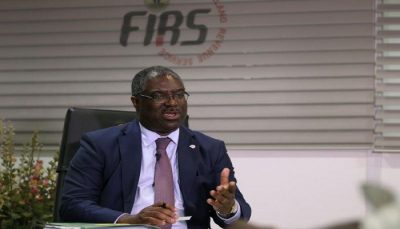
The Federal Inland Revenue Service (FIRS) generated N5 trillion in the second week of this month.
It said by the end of this year, it would have generated N5.3 trillion revenue.
Its Executive Chairman, Mr. Tunde Fowler, in a statement yesterday expalined that if the agency succeeds in pooling the N5.3 trillion revenue, it will mark the highest revenue ever generated by agency in history. “The highest in FIRS history is N5.07 trillion generated in 2012,” he said.
The FIRS’ generation of N5 trillion is significant as it was recorded in “a period when oil prices oscillated between $50 and $70 per barrel. Oil price was at an average of $100 to $120 per barrel between 2010 and 2013” the statement said.
The statement explained that Mr Fowler spoke during the induction of new members of the Joint Tax Board (JTB) yesterday in Abuja.
He said: “FIRS has been able to record significant achievements following maximum support from the Presidency, Ministry of Finance, the JTB and other taxation stakeholders.
“This year, the FIRS, with the support of the Presidency, Ministry of Finance, the JTB and other stakeholders, has been able to generate up to N5 trillion. We believe that we should be able to close at least at N5.3 trillion which should be the highest in the history of FIRS. And we believe that with that additional revenue, the state and Federal Governments would be able to provide more services and more development to the people of Nigeria.”
Fowler urged the new JTB inductees to equip themselves with new ideas and embrace Information Communication Technology (ICT) to be able to face the reality of revenue collection in the ever-changing society.
This new development he said indicated that “we should be able to develop the ability to accept and embrace positive change, maybe due to the fact that change is inevitable, but more significantly that oftentimes, change presents us with the rare breaks that we can exploit to advance individual and collective goals and objectives.”
The FIRS chief also stated that as the global society continues to transform in structure and process, especially with new technologies and ways of doing things, the role that has been presented before tax administrators in an emerging economy such as Nigeria are quite enormous.
He said: “Rather than being overwhelmed by the rapid changes of the 21st century, taxmen should remain undaunted and see the opportunities that are possible to us as a people in general and as tax administrators in particular.
“I believe that history has placed this responsibility on each and every one of us here today to be the critical success factors in our quest towards ensuring sustainable revenue generation for our various jurisdictions and for our country as well.”
Developments in global politics and economics, he noted, “indicate a trend towards increased deemphasis on proceeds from oil and other commodity exports. Huge investments are being made everyday by more advanced economies towards seeking alternative energy sources; and sooner rather than later, oil as a mainstay of the nation’s economy will indeed no longer be sustainable, it is just a matter of time.”

